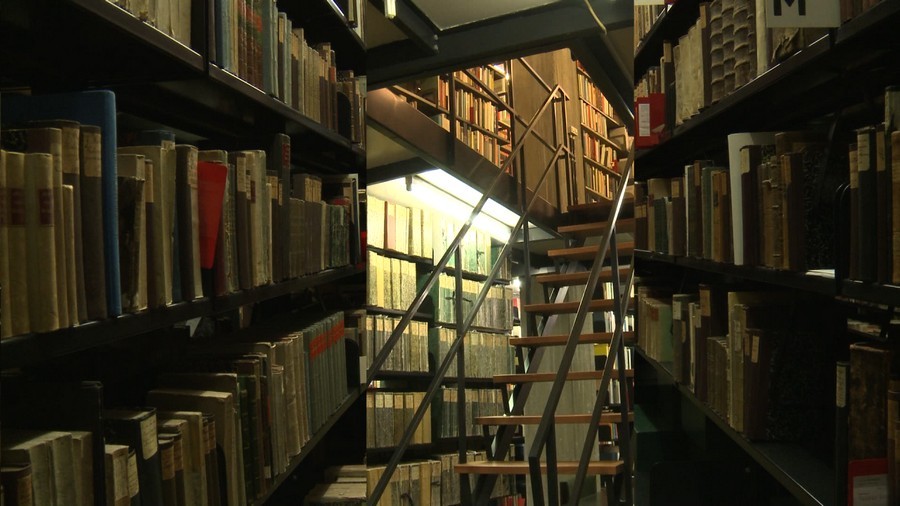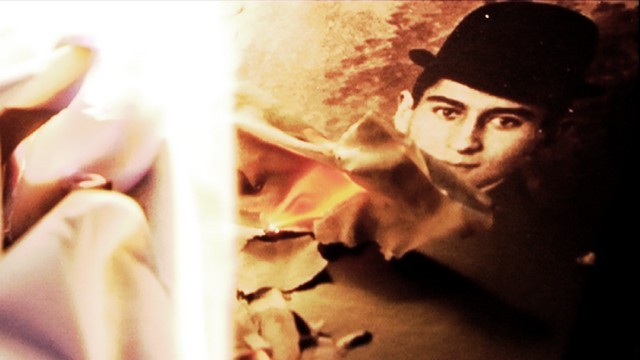While the world may be eternally grateful to Max Brod for preserving some of the greatest works of 20th century literature and transforming Franz Kafka into a global cultural icon, Kafka himself may be turning in his grave. Kafka’s final wish stated that “all that is left in my estate must be burned completely, without reading”, was famously disregarded by his closest friend, and the rest is literary history. However, nearly a century after Kafka’s untimely death, the fate of his invaluable manuscripts is at the heart of a heated debate involving millions of dollars and political wrangling between Israel and Germany.
The film follows the manuscripts from their initial journey in Brod’s suitcase from Nazi occupied Europe to Israel, to their current location, gathering dust in a run down Tel Aviv apartment, closely guarded by an unstable, eccentric woman and dozens of cats. The result is a twisted, bizarre detective story, whose irony and absurdity would not have been lost on the great man himself.
Synopsis
While the world may be eternally grateful to Max Brod for preserving some of the greatest works of 20th century literature and transforming Franz Kafka into a global cultural icon, Kafka himself may be turning in his grave. Kafka’s final wish stated that “all that is left in my estate must be burned completely, without reading”, was famously disregarded by his closest friend, and the rest is literary history. However, nearly a century after Kafka’s untimely death, the fate of his invaluable manuscripts is at the heart of a heated debate involving millions of dollars and political wrangling between Israel and Germany.
Awards
- Special Jury Remi Award – WorldFest Houston, USA, 2012
- Special Jury Mention – Moscow International Detective & Research Film Festival, 2012
- Best Author's Approach - XVI International TV Festival Bar Montenegro, 2011
Festivals
- Caravan Jewish Film Festival, Romania, 2014
- WorldFest Houston, USA, 2012
- Detective International Film Festival, Russia, 2012
- Bucharest Jewish Film Festival, Romania, 2012
Press & Links:
During his lifetime, Franz Kafka burned an estimated 90 percent of his work. After his death at age 41, in 1924, a letter was discovered in his desk in Prague, addressed to his friend Max Brod. “Dearest Max,” it began. “My last request: Everything I leave behind me . . . in the way of diaries, manuscripts, letters (my own and others’), sketches and so on, to be burned unread.” Less than two months later, Brod, disregarding Kafka’s request, signed an agreement to prepare a posthumous edition of Kafka’s unpublished novels. “The Trial” came out in 1925, followed by “The Castle” (1926) and “Amerika” (1927). In 1939, carrying a suitcase stuffed with Kafka’s papers, Brod set out for Palestine on the last train to leave Prague, five minutes before the Nazis closed the Czech border. Thanks largely to Brod’s efforts, Kafka’s slim, enigmatic corpus was gradually recognized as one of the great monuments of 20th-century literature. For the entire review by Elif Batuman /New York Times - http://www.nytimes.com/2010/09/26/magazine/26kafka-t.html? pagewanted=1&_r=1 "After lengthy legal battle, Franz Kafka and Max Brod safety deposit boxes being opened. Nine remaining boxes in which the writers' manuscripts were hidden for decades are being opened in Tel Aviv and Zurich. The court has banned publication of their contents."
For the entire article by Ofer Aderet/Haaretz.com, July 13, 2010, check: http://www.haaretz.com/print-edition/news/after-lengthy-legal-battle-franz-kafka-and-max-brod-safety-deposit-boxes-being-opened-1.301792Festivals
- Caravan Jewish Film Festival, Romania, 2014
- WorldFest Houston, USA, 2012
- Detective International Film Festival, Russia, 2012
- Bucharest Jewish Film Festival, Romania, 2012
- International Francophone Film Festival, Bratislava, Slovakia, 2012
- Toronto Jewish Film Festival, Canada, 2012
- The 14th International Francophone Film Festival Bratislava, Slovak Republic, 2012
- Westchester Jewish Film Festival, USA, 2012
- Young Israel Of Scarsdale Synagogue, USA, 2012
- Westchester Jewish Film Festival, USA, 2012
- TV Bar Film Festival, Montenegro, 2011
- Leipzig International Documentary Film Festival, Germany, 2011
- UK Jewish Film Festival, 2011
- DocAviv Int'l Film Festival - Official Competition, Israel, 2011
Educational
- Brandeis University
- Library of Congress
- Arizona State University
- Maryland University
- Duke university
- Kawartha Lakes Public Library
- Yad VaShem Visual Center
- Harvard University
- University of Pennsylvania
- AJS Conference, 2011
- University of South Florida
Awards
- Special Jury Remi Award – WorldFest Houston, USA, 2012
- Special Jury Mention – Moscow International Detective & Research Film Festival, 2012
- Best Author's Approach - XVI International TV Festival Bar Montenegro, 2011






